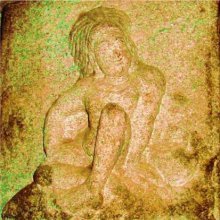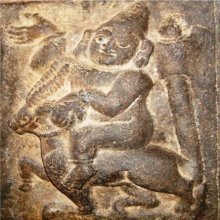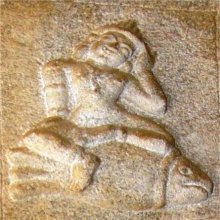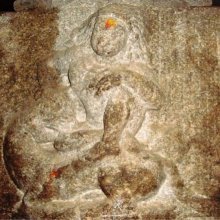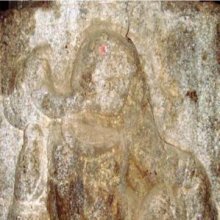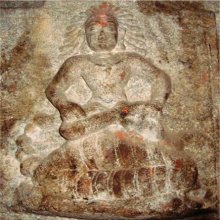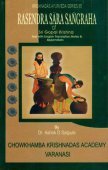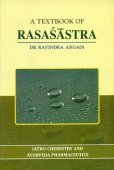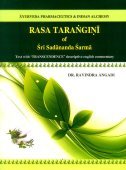Karnataka, Karṇāṭaka: 12 definitions
Introduction:
Karnataka means something in Hinduism, Sanskrit, the history of ancient India. If you want to know the exact meaning, history, etymology or English translation of this term then check out the descriptions on this page. Add your comment or reference to a book if you want to contribute to this summary article.
Images (photo gallery)
(+27 more images available)
In Hinduism
Purana and Itihasa (epic history)
Source: archive.org: Puranic EncyclopediaKarṇāṭaka (कर्णाटक).—A country of South India. Mahābhārata says like this: "There are a few more countries to the south and they are: Drāviḍa, Kerala, Prācya, Muṣika, Vanavāsika, Karṇāṭaka, Māhiṣaka, Vikalpa and Mūṣaka." (Chapter 9, Bhīṣma Parva).
Source: Cologne Digital Sanskrit Dictionaries: The Purana IndexKarṇāṭaka (कर्णाटक).—(Dakṣiṇa)—Inhabitants of south Karṇāṭaka.*
- * Bhāgavata-purāṇa V. 6. 7.

The Purana (पुराण, purāṇas) refers to Sanskrit literature preserving ancient India’s vast cultural history, including historical legends, religious ceremonies, various arts and sciences. The eighteen mahapuranas total over 400,000 shlokas (metrical couplets) and date to at least several centuries BCE.
Shaivism (Shaiva philosophy)
Source: DSpace at Pondicherry: Siddha Cult in Tamilnadu (shaivism)Nātha cult was very popular in Karnātaka, which was believed to be a blend of Vajrāyāna Buddhism and Śaivism. Though there are no exclusive followers of the cult in Karnātaka, the centers of their activity are there even now. Gorakṣanāth and Matśyendranāth themselves are believed to have popularlised the cult in Karnātaka. Nātha mathas are found in many parts of Karnātaka beginning from Handi Badganāth in Belgaum district to Kadire and Viṭṭal in Dakśiṇa Kaṉṉada.

Shaiva (शैव, śaiva) or Shaivism (śaivism) represents a tradition of Hinduism worshiping Shiva as the supreme being. Closely related to Shaktism, Shaiva literature includes a range of scriptures, including Tantras, while the root of this tradition may be traced back to the ancient Vedas.
India history and geography
Source: Archaeological Survey of India: Śaiva monuments at PaṭṭadakalKarṇāṭaka (कर्णाटक).—In Karnāṭaka from the times of Cālukya kings of Kalyāṇa the art of building temples of triple sancta become frequent. To find the origin of this art we have to see the work of queen mother Rāṇi Vinayavati at Bādāmi. During the reign of her son Vijayāditya, in the 3rd year of her son’s regnal year, Śaka 621, corresponding to A.D. 699, she had a temple built with three sancta and had installed three Gods namely Brahmā, Viṣṇu and Maheśvara. Now the temple is empty and goes by the name of Jambulinga temple but the inscription in situ furnishes the historical facts.
There is a new style integrating nāgara and drāviḍa features, especially in Paṭṭadakal. There is a Karnāṭa style and in order to signify the local originality and the different influences, the terms Karnāṭa-nāgara and Karnāṭa-drāviḍa styles are the most practical denominations. The Karnāṭa-drāviḍa temples of Paṭṭadakal are the Vijayeśvara, Lokeśvara and Trailokyeśvara temples. The Karnāṭa-nāgara are the Galaganātha, Jambuliṅga, Kāḍasiddheśvara, Kāśīviśveśvara temples. Pāpanātha is a hybrid. Others are too small or ruined and do not bear any mark of a distinctive style.
Source: Shodhganga: a concise history of Sanskrit Chanda literature (history)Karnataka (कर्नतक) is a land, which produced many poets and authors, who nourished the Sanskrit literature from time to time. The patronage of the Woḍeyar dynasty of Mysore for the scholarship was noteworthy. The kings themselves were also well versed in Śāstras and in appreciation they were providing patronage to many luminaries.
Source: Singhi Jain Series: Ratnaprabha-suri’s Kuvalayamala-katha (history)Karṇāṭaka (कर्णाटक) is the name of a country included in an international list of students participating in universities of ancient India, as depicted in the Kathās (narrative poems) such as Uddyotanasūri in his 8th-century Kuvalayamālā (a Prakrit Campū, similar to Kāvya poetry).—Page 150.17 f. & 151.1-5: There is described an educational institution which included students from [e.g., Karṇāṭaka] [...]. The courses of study comprised Vyākaraṇa, Buddhism, Sāṃkhya, Nyāya, Anekānta or Jaina and Lokāyata or Cārvāka philosophies. At another place (151.6-11) the prince came across persons who cultivated the seventy-two arts and sixty-four sciences, [...].

The history of India traces the identification of countries, villages, towns and other regions of India, as well as mythology, zoology, royal dynasties, rulers, tribes, local festivities and traditions and regional languages. Ancient India enjoyed religious freedom and encourages the path of Dharma, a concept common to Buddhism, Hinduism, and Jainism.
Languages of India and abroad
Sanskrit dictionary
Source: DDSA: The practical Sanskrit-English dictionaryKarṇāṭaka (कर्णाटक).—(pl.) Name of a country in the south of the Indian Peninsula; (kāvyam) कर्णाटेन्दोर्जगति विदुषां कण्ठभूषत्वमेतु (karṇāṭendorjagati viduṣāṃ kaṇṭhabhūṣatvametu) Vikr.18.12
-ṭī f.
1) A woman of the above country; कर्णाटीचीनपीनस्तनवसनदशादोलनस्पन्दमन्दः (karṇāṭīcīnapīnastanavasanadaśādolanaspandamandaḥ) Udb. कर्णाटीचिकुराणां ताण्डवकरः (karṇāṭīcikurāṇāṃ tāṇḍavakaraḥ) Vb.1.29.
2) The हंसपदी (haṃsapadī) plant.
3) One of the Rāgintod;īs or musical modes.
Derivable forms: karṇāṭakaḥ (कर्णाटकः).
See also (synonyms): karṇāṭa.
Source: Cologne Digital Sanskrit Dictionaries: Benfey Sanskrit-English DictionaryKarṇāṭaka (कर्णाटक).—[karṇāṭa + ka = karṇāṭa], m. [Bhāgavata-Purāṇa, (ed. Burnouf.)] 5, 6, 8.
Source: Cologne Digital Sanskrit Dictionaries: Monier-Williams Sanskrit-English DictionaryKarṇāṭaka (कर्णाटक):—[from karṇāṭa] m. [plural] Name of a people and the country they inhabit, [Viṣṇu-purāṇa; Bhāgavata-purāṇa etc.]
[Sanskrit to German]
Sanskrit, also spelled संस्कृतम् (saṃskṛtam), is an ancient language of India commonly seen as the grandmother of the Indo-European language family (even English!). Closely allied with Prakrit and Pali, Sanskrit is more exhaustive in both grammar and terms and has the most extensive collection of literature in the world, greatly surpassing its sister-languages Greek and Latin.
Kannada-English dictionary
Source: Alar: Kannada-English corpusKarṇāṭaka (ಕರ್ಣಾಟಕ):—[noun] = ಕರ್ಣಾಟ - [karnata -] 1 & 2.
--- OR ---
Karnāṭaka (ಕರ್ನಾಟಕ):—
1) [noun] Kannaḍa one of the major Dravidian languages, and the official language of, and chiefly spoken by the people of, Karnāṭaka.
2) [noun] Karnāṭaka, one of the major states of Indian republic, situated in the southern plateau.
Kannada is a Dravidian language (as opposed to the Indo-European language family) mainly spoken in the southwestern region of India.
See also (Relevant definitions)
Starts with: Karnatakabhasha, Karnatakadesha, Karnatakalaha, Karnatakam, Karnatakavishaya.
Ends with: Adikarnataka, Bhatta karnataka, Dakshinakarnataka, Vancheshvara hoshanikarnataka.
Full-text (+1041): Karnatakabhasha, Karnata, Karnatakadesha, Karnatashva, Bhatta karnataka, Karnati, Karnatika, Tikalar, Adiranga, Kalashakshetramahatmya, Pundarikavitthala, Amdekuruba, Ghurjaranati, Gurjari, Malavapamcama, Telugakambodi, Dramidagaula, Dramidaghurjari, Dramidavarali, Deshyakambhoji.
Relevant text
Search found 53 books and stories containing Karnataka, Karṇāṭaka, Karnāṭaka; (plurals include: Karnatakas, Karṇāṭakas, Karnāṭakas). You can also click to the full overview containing English textual excerpts. Below are direct links for the most relevant articles:
United Karnataka < [January-February, 1929]
Report of The States Re-Organisation Commission < [October 1955]
Report of The States Re-Organisation Commission < [October 1955]
Amaravati Art in the Context of Andhra Archaeology (by Sreyashi Ray chowdhuri)
Sannati And Kanaganahalli < [Chapter 5 - Impact of Amarāvatī Art]
Kavyamimamsa of Rajasekhara (Study) (by Debabrata Barai)
Part 8.5 - Region of Dakṣiṇāpatha (southern part) < [Chapter 5 - Analyasis and Interpretations of the Kāvyamīmāṃsā]
Part 14 - Kāvyaprakāśa of Mammaṭa < [Chapter 2 - A General Outlines of Sanskrit Poetics]
Part 6 - Rājaśekhara’s Elaboration on Plagiarism (Introduction) < [Chapter 5 - Analyasis and Interpretations of the Kāvyamīmāṃsā]
Puranic encyclopaedia (by Vettam Mani)
The Skanda Purana (by G. V. Tagare)
Chapter 18 - The Story of Mātaṅgī and Karṇāṭaka < [Section 2 - Dharmāraṇya-khaṇḍa]
Chapter 2 - A List of Different Sacred Places of Śiva on the Earth < [Section 3b - Arunācala-khaṇḍa (Uttarārdha)]
Chapter 2 - The Story of Kalmāṣapāda: Greatness of Gokarṇa < [Section 3 - Brāhmottara-khaṇḍa]
Dasarupaka (critical study) (by Anuru Ranjan Mishra)
Part 7 - Characters in the Līlāvatī-Vīthī < [Chapter 7 - Vīthī (critical study)]
Part 14 - Conclusion < [Chapter 10 - Prakaraṇa (critical study)]
Part 2 - The Summary of the Līlāvatīvīthī < [Chapter 7 - Vīthī (critical study)]
Related products
(+2 more products available)
